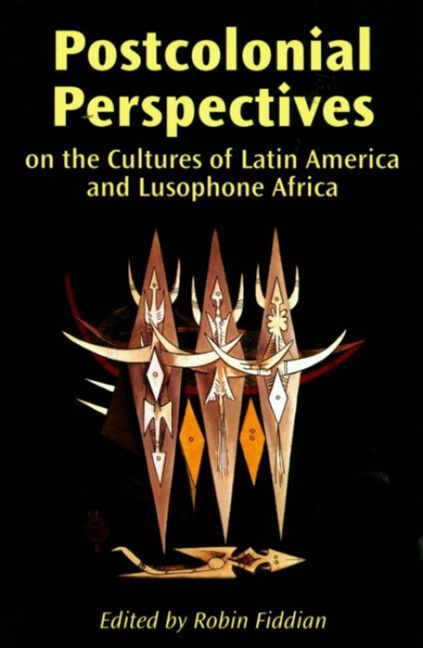Book contents
- Frontmatter
- Contents
- Preface
- Locating the Object, Mapping the Field: the Place of the Cultures of Latin America and Lusophone Africa in Postcolonial Studies
- Chapter One On Metropolitan Readings of Latin American Cultures: Ethical Questions of Postcolonial Critical Practice
- Chapter Two Ig/noble Barbarians: Revisiting Latin American Modernisms
- Chapter Three José Carlos Mariátegui: Culture and the Nation
- Chapter Four Doing Time in Peru: the Poetics of Multitemporality as Method for Cultural History
- Chapter Five America, Americanism and the Third World in the Work of Leopoldo Zea
- Chapter Six Fernando Ortiz's Transculturation: the Postcolonial Intellectual and the Politics of Cultural Representation
- Chapter Seven Caribbean Masks: Frantz Fanon and Alejo Carpentier
- Chapter Eight Colonial Crosswords: (In)voicing the Gap in Mia Couto
- Index
Chapter Two - Ig/noble Barbarians: Revisiting Latin American Modernisms
- Frontmatter
- Contents
- Preface
- Locating the Object, Mapping the Field: the Place of the Cultures of Latin America and Lusophone Africa in Postcolonial Studies
- Chapter One On Metropolitan Readings of Latin American Cultures: Ethical Questions of Postcolonial Critical Practice
- Chapter Two Ig/noble Barbarians: Revisiting Latin American Modernisms
- Chapter Three José Carlos Mariátegui: Culture and the Nation
- Chapter Four Doing Time in Peru: the Poetics of Multitemporality as Method for Cultural History
- Chapter Five America, Americanism and the Third World in the Work of Leopoldo Zea
- Chapter Six Fernando Ortiz's Transculturation: the Postcolonial Intellectual and the Politics of Cultural Representation
- Chapter Seven Caribbean Masks: Frantz Fanon and Alejo Carpentier
- Chapter Eight Colonial Crosswords: (In)voicing the Gap in Mia Couto
- Index
Summary
As a Brazilian, as a Latin American, and as a visitor to Europe both literally and critically, I cannot help being struck by the stubborn implications of irrepressible Eurocentrisms, by die-hard binaries and their sinister effects. As recently as 1994, from Germany, there re-echoed the platitude of Imaginación y barbarie, a revisionist invitation for the would-be Latin Americanist to be reinstructed in the colonizing polarities of nineteenth-century positivisms, long debated but too often subject to reflex rather than reflection. Whether or not we ponder the contexts of Domingo Faustino Sarmiento's juxtaposition of ‘civilización y barbarie’ and subsequent variations on the theme, it will always be necessary to resist the teleologies lurking within the very terms of analysis. It is not as if writers both Latin American and Latin Americanist have not many times already dismantled, debunked and, since the 1970s, deconstructed such oppositions, as we shall see.
It is with some circumspection that I regard the possibility of representing Latin America. Speaking for the continent in an undifferentiated manner is an impossibility. Yet, as I interrogate the re-emergence, in our days, of the catechizing, reforming, civilizing and, for that matter, colonizing bias of the imagination and barbarism binary, I shall explore two avenues of Latin American enunciation of postcolonial subjectivities in Hispanic and Lusophone cultures, each of which problematizes such juxtapositions, wellknown to Hispanists, less so to Latin Americanists. One trajectory, which is conceptual, broaches the historically shifting meanings of the civilization/barbarism dichotomy as studied and contextualized by Roberto Fernández Retamar and Rafael Humberto Moreno- Durán. It thus makes conspicuous the colonizing and cyclical dimensions of the binary and its variants, recently re-appropriated as a civilizing mission with a moral motivation, by Karl Kohut. The other trajectory leads to Colombian and Brazilian modernisms of the early twentieth century, approached not in aesthetic terms but rather in the cultural dimensions raised, for example, by the Brazilian Aracy Amaral. With a suggestive title, ‘As Duas Américas Latinas ou Três, Fora do Tempo’, she stresses the unevenness of Latin American modernisms. She further points out that in Europe, at the end of the century, Modernism implied an urban behaviour that exalted the city, the phenomenon of the crowd, of loneliness and, as a result, was associated with a Romantic sense of the new.
- Type
- Chapter
- Information
- Publisher: Liverpool University PressPrint publication year: 2000



